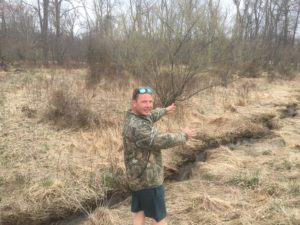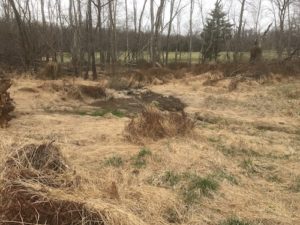Volume 24 Issue 2, Spring 2019
by Michael Myers and Dave Manning
Native habitat is the cornerstone of Loudoun County’s wildlife, providing a year-round food source as well as shelter for raising young and protection from predators. Native flora is also a critical component in water quality. Trees, shrubs, and grasses along local waterways provide a number of benefits. Plants slow water runoff, stabilize stream banks, and filter pollutants pouring into our creeks and streams from our roads, parking lots, and lawns.
Vegetation also absorbs some of the nitrogen and phosphorus that cascade from lawns and farms and lead to algal blooms and die-offs that starve our waters of oxygen. Forested buffers increase the leaf canopy, keeping the water cooler and thus retaining more dissolved oxygen. Riparian buffers are not only home to a variety of plant and animal species, but, if they are wide enough, also provide vital corridors for safer movement of wildlife.
Riparian buffers are crucial elements for water quality protection in the rural western portions and the suburban eastern portions of Loudoun County. Managed growth and responsible design, such as including riparian buffers for all waterways, help create a world in which people and wildlife can thrive together in Loudoun County. Any benefits we can provide to protect water quality in the county helps to protect water quality downstream in the Chesapeake Bay.
Loudoun Wildlife Conservancy’s Habitat Restoration program is charged with working with the community to restore native habitat not only to benefit our water quality and wildlife, but to provide important learning opportunities for citizens interested in restoring native habitats. Finding willing partners to support restoration projects can be difficult due to the financial capital and volunteer capacity demands of restoration projects.

Farm manager Mike Smith points out the creek in the buffer restoration area. Photo by Dave Manning
This spring, Loudoun Wildlife found a willing partner in JK Community Farm, which has both a site for a project and a stream of volunteers to tap into for help. Furthermore, the Conservancy was awarded a grant from the Chesapeake Bay Restoration Fund for an environmental education and restoration project relating to the Chesapeake Bay and its tributaries.
The Chesapeake Bay Restoration Fund is made possible by revenue generated from Friend of the Chesapeake license plate sales. Since 1996, over 300 community groups have received awards for volunteer restoration and education projects benefiting the Chesapeake Bay. Loudoun Wildlife Conservancy’s grant award helps fund this issue of the Habitat Herald and the upcoming riparian buffer planting with JK Community Farm. To apply for a Friend of the Chesapeake license plate, visit your local Virginia Department of Motor Vehicles or contact Loudoun Wildlife for more information.
JK Community Farm, a 501(c)(3) nonprofit organization founded in 2018 by JK Moving Services and led by Samantha Kuhn, is located south of Round Hill on Airmont Road. The farm “provides children, senior citizens, and families facing food insecurity with fresh, organic fruit, vegetables, and protein,” according to its website. All the food produced on the farm is donated to Loudoun Hunger Relief and other local food banks. Farm manager Mike Smith stated that the farm produced and distributed over 32,000 pounds of fresh food in its first year of operation. He hopes to double that output this year with the help of the hundreds of volunteers who contributed time and sweat equity to the organization’s efforts last year.

The planting project in this wetland/bottom land area of the farm will help protect the water quality downstream and provide habitat for wildlife. Photo by Dave Manning
The farm sits atop a gently sloping landscape that, while providing excellent drainage for the farm, leads to a swampy bottomland at the field’s bottom. The bottomland feeds into a small stream whose headwaters begin there and eventually flow into Sleeter Lake near Round Hill, which is the headwaters of the North Fork of Goose Creek, a tributary of the Potomac River and Chesapeake Bay.
In March, Samantha, Mike, and a group from Loudoun Wildlife toured the farm and identified the bottomland and creek as an ideal candidate for a riparian buffer restoration project. With the cooperation of JK Community Farm, its willing cadre of volunteers, and the funds from Friend of the Chesapeake license plates and the Chesapeake Bay Restoration Fund, Loudoun Wildlife Conservancy will install a swath of native bushes and trees along the creek and soggy bottomland this spring. This planting will help protect the water quality downstream, and it will provide habitat for wildlife. The project will also provide volunteer opportunities for Loudoun Wildlife members and Habitat Herald readers who are looking for projects to get their hands dirty and feet wet! Email Volunteer Coordinator Kim Strader, kstrader@loudounwildlife.org, if you would like to volunteer on Saturday, May 11th.
Resources: https://jkcommunityfarm.org/

